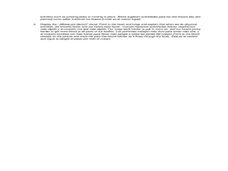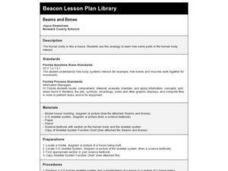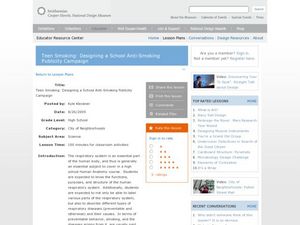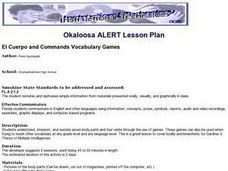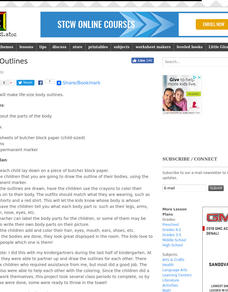Illustrative Mathematics
How Many Cells Are in the Human Body?
Investigating the large numbers of science is the task in a simple but deep activity. Given a one-sentence problem set-up and some basic assumptions, the class sets off on an open-ended investigation that really gives some...
Baylor College
Food for the Brain
With a couple of neat diagrams on student handouts, your life science or health class will examine the contents and serving sizes of healthy foods. They dissect a slice of pizza and scrutinize the nutritional value of its components in...
Baylor College
How Much Water Do Humans Need?
Physical or life science learners measure the amounts of water eliminated by intestines and the urinary system, and the amounts lost via respiration and perspiration. In doing so, they discover that the body's water must be replenished...
Forest Foundation
The Nature of Trees
Young botanists examine the different parts of tress and then draw parallels between the functions of these parts and the function of parts of the human body.
Curated OER
Music: "Hearing Between The Lines"
The class listens to and reads lyrics from popular songs that explore themes of self-esteem, body image, and eating disorders. The song interpretations will serve as a jumping-off point to deeper discussion on the issues, culminating in...
Curated OER
Do the Hokey Pokey in Many Languages
Students replace the body part words in the tune The Hokey Pokey with the same body part words in other languages. They learn the vocabulary more readily because of the connection to music.
Curated OER
Reproductive System
Fifth graders identify and define parts of the reproductive system. In this health activity, the teacher introduces the parts of the reproductive system, then students match body part cards to the corresponding definition cards.
Curated OER
What Happens to Our Hearts When We Are Active?
Learners discover the benefits of a healthy heart through exercise. In this physical education lesson, students participate in a few physical activities in order to get their hearts beating faster. Learners examine a visual...
Curated OER
Beams and Bones
Fifth graders learn how parts of the human body interact and how bones and muscles work together.
Curated OER
The Nutrients Public Transportation System
Students investigate the human circulatory system by experimenting with hoses. In this human body lesson, students create a system of hoses simulating the circulatory system which they utilize to pass objects through....
Curated OER
Teen Smoking: Designing a School Anti-Smoking Publicity Campaign
Students review the human respiratory system and the effects on the human body. In this design lesson students brainstorm and create a prototype then present it to the class.
Curated OER
Are You a Golden Ratio?
Learners explore the concept of the golden ratio in nature and architectural design. They discuss examples such as petals on a sunflower and the Parthenon. In small groups they take turns measuring their body parts to find a golden ratio.
Curated OER
DNA and Individual Differences
Middle schoolers list differences between DNA-related terms and create a simple DNA circle map. They order terms including human body, organ, tissue, cell, nucleus, etc. from largest to smallest. They discuss differences and...
Curated OER
Measuring Work
Students explore what work is, measure work done in moving an object, and tell how energy is related to work in both machines and the human body. In this measuring work lesson plan, students walk up a flight of stairs, measure the height...
Curated OER
Hula Hoop Twister
Students demonstrate how the body moves and the use of personal and general space concepts.Students identify different body parts and colors.students identify various body parts (knees, elbows, hands, feet, etc), right and left side of...
Curated OER
El Cuerpo and Commands Vocabulary Games
Students study Spanish vocabulary words for body parts, and also study a number of action verbs. They participate in Total Physical Response by responding to teacher given commands. They play a number of games based on the vocabulary.
Curated OER
Hermit Crabs Lifecycle & Stages
Students review the life cycle of land hermit crabs by viewing a poster or transparency. They identify the different body parts of a hermit crab and what each part is used for.
Curated OER
Billy Brown and The Belly Button Beastie
Students read the book Billy Brown and The Belly Button Beastie and complete a variety of activities related to the book. In this reading lesson plan, students complete activities including discovering body parts, bubbles, retelling,...
Curated OER
The Insect Files
Students are provided with a physical description of the insect, in words and graphics, including body parts, special adaptations, color, and so on. They explore and report on all four elements of an insect's habitat: food, water,...
Curated OER
Health and Wellness
Students dance around to exercise and learn about the function of their different body parts. In this exercise lesson plan, students dance around to promote health and wellness.
Curated OER
Whst Makes You Tick?
Eleventh graders explore the major organs of the circulatory system. In this circulatory system lesson, 11th graders create, identify and describe parts of the system. Students view a list of major organs and predict what their job is....
Curated OER
Healthy Colon with Good Digestion and Fiber
Sixth graders learn about the colon and what it does. In this lesson about digestion and the colon, 6th graders analyze what this organ's job is. Students complete four activities where they explore the importance of fiber, the makeup of...
Curated OER
Human Embryology
Ninth graders are introduced to the concept of human embryology. Individually, they complete an exercise in which they determine which trait they got from which family member. In groups, they identify and label the reproductive organs...
Curated OER
Body Outlines
Students trace their bodies onto butcherblock paper and then add clothes, hair, eyes, mouths, etc. They use them to identify their body parts.







